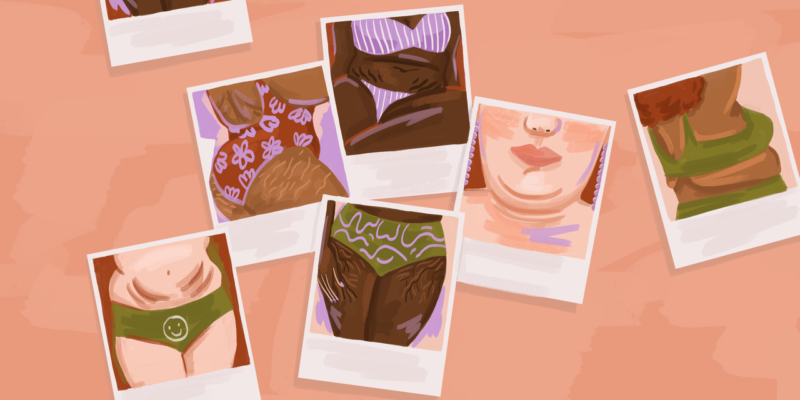
Welcome to the Learning Curve, a monthly column where we unpack the complicated experience of accepting your own body in a world that just doesn’t seem to want you to. This month, news editor Nicola Dall’Asen addresses the harmful and hidden message celebrities send when they refuse to be photographed or filmed in an “unflattering” — nay, normal — way.
We’re alone in her room, my conventionally hot friend and I, shuffling through Forever 21 crop tops and Revlon lipsticks like a groundhog who isn’t ready to see its own shadow. It’s a Friday night and we’re teenagers so, naturally, we’re hunting for outfits that’ll make us look older and sexy for our wild night out at the local AMC theater. She turns abruptly to me, sending her long, wavy hair over one delicate shoulder, her flat stomach peeking out from above her mid-rise jeans. “I feel so fat,” she delfates, and my desire to be seen in public shatters. Because when she says she feels fat, I know what she really means is that she feels unattractive, as if those two things are mutually exclusive (they’re not). But she’s neither of those things. So there I sit in front of her, twice her size and height, wondering how she must think I look. I never ask. I don’t want to know the answer.
Those kinds of conversations thankfully don’t happen to me nearly as often in adulthood, and I’ve learned how to handle it when it does. Celebrities and influencers, however, say this to everyone, all the time, and there’s pretty much jack shit I can do about it. Obviously, A-listers aren’t coming to my house to hang out and unload all their insecurities on me — but they constantly send the same hurtful message when they refuse to be photographed or perceived in a certain way. Indirectly and probably without them even realizing it, a famous person’s own insecurities can send regular people into a head-first tailspin of our own. Celebrities have been accused of, in many instances, deleting their own posts or altering the images in their posts (Britney Spears, and Lindsay Lohan have faced accusations, among others). The most recent case in point: Khloé Kardashian’s “photogate” incident from April. As a member of one of the world’s most notable families — one who’s taken her fair share of both warranted and unwarranted criticism — she’s a prime example of what can happen when a celebrity is afraid to be seen as is.
If, by some miracle, you didn’t hear about it, here’s the quick version: An assistant of the Kardashian family posted a lightly edited candid bikini photo of her to Instagram Stories. In the post, Kardashian flashed a sweet, close-lipped smile right into the camera, phone in hand, and one hip cocked while she stood near a pool. Her legs, as usual, looked long and tanned, her stomach flat, hips wide, waist narrow, breasts perky… by any average person’s standards, it still would’ve been a Tinder-profile-worthy swimsuit shot. In my humble opinion, she looked fucking hot. But the differences between that photo and Kardashian’s typical Instagram posts managed to highlight just how much planning, posing, and filtering goes into our public perception of her. Page Six reported that “members of the Kardashian camp” almost immediately tried to have copies of the image wiped entirely from the internet under legal threats because it was unauthorized.